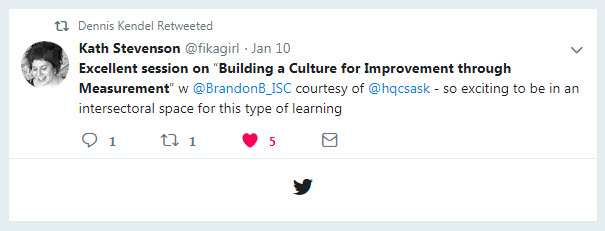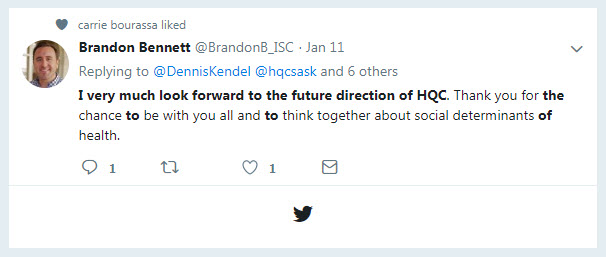Last week, leaders and analysts from across the province’s human services sector gathered in Saskatoon to learn about the key role measurement plays in supporting a culture of continuous improvement.
The one-day session hosted by the province’s Health Quality Council (HQC) attracted participants from justice, health care, social services, and community organizations . It was led by Brandon Bennett, an improvement fellow with the Institute for Healthcare Improvement (IHI) who has extensive international experience using measurement to bring about change in a variety of sectors.
Bennett grounded the day in W. Edwards Deming’s System of Profound Knowledge: every set of processes happens within a complex system. He emphasized that even relatively large systems, such as the justice system or health care, are themselves embedded within an even broader system.
Understanding complex systems begins with a robust measurement system, according to Bennett. The right family of measures can help leaders understand their system, improve their system, and predict the future performance and direction of their system.



The workshop helps build a foundation of a shared perspective to support future collaboration and improvement work across sectors. Patrick Falastein, HQC’s Director of Health System Planning and Reporting, said that connecting people across sectors is a natural evolution for his agency, which has for the past 16 years played an active role in bringing together system partners to learn together and collaborate on improvements within Saskatchewan’s health care system.
“There are many factors outside health care that impact the health status of individuals and communities, such as an education, and social and physical environments,” says Falastein.
“We are excited to be broadening our collaborative efforts to partner with other sectors that hold a stake in supporting the health of the citizens of Saskatchewan.” (Patrick Falastein, Director of Health System Planning and Reporting, HQC)
While he was in the province, Bennett also led sessions on measurement for health care providers participating in the Clinical Quality Improvement Program (CQIP), and shared with HQC’s board of directors and senior staff examples of what is possible through inter-sectoral collaboration:
- Bay Area Learning Initiative: Public healthcare systems across California’s Bay Area share a vision of equitable communities where all residents have a path to achieve their optimal health–a vision they know is impossible without ensuring that everybody has access to the resources essential for a healthy life. Launched in April 2018, this 16-month collaborative aims to: Improve outcomes in existing social needs programs; Design and test new tools and models to connect people with essential needs; Develop systems to coordinate efforts and support health for all patients; and Design a regional framework for coordination of care delivery and social services
- Helping Family Initiative: Helping Families is a community, self-help program. It serves everyone in each community by reducing illegal drug use and other crime, building citizen-police trust, stopping crime before it happens, addressing the causes of civil unrest and conflicts with law enforcement and showing young people and their families how they can access opportunities for better lives. It provides law enforcement with access to services that can change environments that produce crime.
- Built for Zero: Homelessness is a solvable problem that has lost its sense of urgency. Built for Zero is a rigorous national change effort designed to help a core group of committed US communities end chronic and veteran homelessness.



